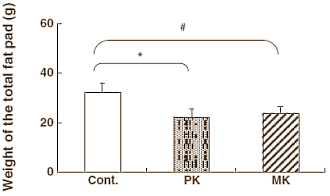|
Animal study: vitamin K supplementation reduces fat
Vitamin K is a neglected vitamin, according to yet another study published in Bone by nutritionists at Japan Women's University. The Japanese discovered that vitamin K supplementation not only strengthens the bones of lab animals, but also reduces their fat mass.
Vitamin K
Epidemiological studies show that people who consume large amounts of vitamin K have stronger bones than people whose diet contains little vitamin K. [Am J Clin Nutr. 1999 Jan; 69(1): 74-9.] Supplementation consisting of 0.5 mg of difficult-to-absorb vitamin K1 from plants has no effect on the skeleton. [J Clin Endocrinol Metab. 2008 Apr; 93(4): 1217-23.] A higher dose of 5 mg vitamin K1 doesn't have much effect on bone mass, but does reduce the chance of bone breakages. [PLoS Med. 2008 Oct 14; 5(10): e196.]
Vitamin K2 is found in animal-based products, such as cheese, meat and natto, a fermented soya product. Vitamin K2 analogues are more effective than vitamin K1, but few human studies have been done on the effects of vitamin K2 on the skeleton. The few studies that have been published are positive though. [J Korean Med Sci. 2011 Aug; 26(8): 1093-8.] [J Nutr Sci Vitaminol (Tokyo). 2009 Feb; 55(1): 15-21.]
Study
The Japanese researchers gave female rats feed containing 600 mg vitamin K1 per kg [PK] or 600 mg vitamin K2, for a period of three months. A control group was given regular feed [Cont.].
Results
Vitamin K1 supplementation increased the mineral density of the rats' bones. Vitamin K1 is found in leafy vegetables, the best sources being curly kale and spinach. One cup of steamed curly kale contains 1000 micrograms and one cup of steamed spinach contains 900 micrograms of vitamin K1.
The second table below shows that supplementation with vitamin K2 made the rats' bones stronger. This vitamin had no effect on the mineral density. Vitamin K1 did boost the bone density, but didn't make the bones stronger.


At the end of the three months the total amount of body fat in both vitamin K groups had decreased. Vitamin K2 was slightly more effective in this respect than vitamin K1.
Mechanism
Exactly what the link is between vitamin K and fat loss the Japanese did not examine. They do refer, however, to a 2008 animal study done at Columbia University, in which the bone-building hormone osteocalcin inhibited the growth of fat mass as a result of making the cells more sensitive to insulin. [Proc Natl Acad Sci U S A. 2008 Apr 1; 105(13): 5266-70.]
Vitamin K activates osteocalcin. That's why vitamin K makes bones stronger, and may also be why it helps fat loss, the Japanese think.
Conclusion
"The amount of vitamin K intake from the experiment diets is massive compared to nutritional requirements for vitamin K", the researchers warn. "Further dose-response studies are required to investigate whether long-term supplementation with doses in a more nutritional range would deliver the changes seen in this study."
Source:
Bone. 2011 May 1;48(5):1036-42.
More:
More energy and more fat burning with indigestible starch 08.06.2012
Fat percentage too high? Add rice protein to your shake 01.05.2012
Tungsten: weight loss trace element 02.04.2012
|


